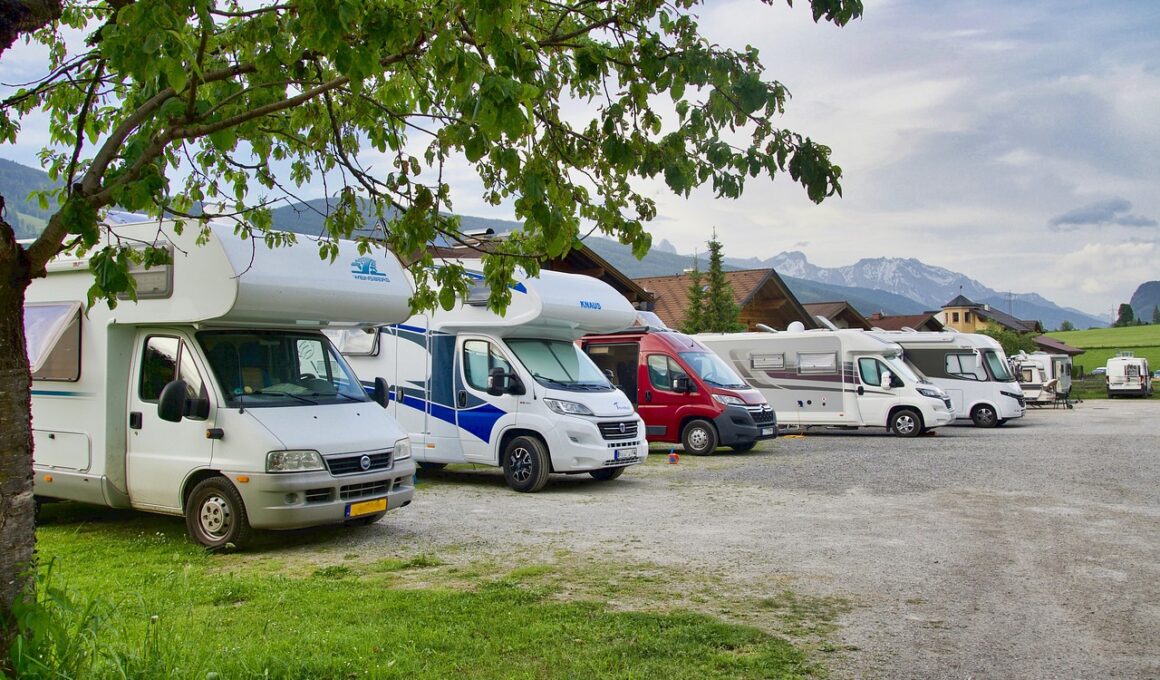Preparing for Your RV Insurance Inspection
Preparing for an RV insurance inspection is crucial for ensuring that your vehicle is adequately covered. Begin by reviewing your insurance policy to understand the specific requirements for the inspection. Make sure you gather all necessary documents, including registration, previous inspection reports, and maintenance records. These documents can help streamline the inspection process. Before the day arrives, check your RV for any outstanding repairs. Addressing issues like leaks or worn parts can positively influence the inspection outcome. It is also wise to take photographs of your RV’s condition. These images serve as evidence if claims arise later. Ensure the interior and exterior are clean and organized, making it easier for the inspector to evaluate any potential issues. Don’t forget to remove personal items, as a tidy RV can help the inspector focus on critical areas. Additionally, reach out to your insurance provider for guidelines or potential checklists about the inspection. This proactive approach not only makes the process smoother but also enhances your understanding of your coverage and responsibilities as the RV owner.
Understanding Key Inspection Areas
Your RV insurance inspection focuses on various crucial components that could impact your coverage. One of the primary areas of concern is the exterior condition of the vehicle. Inspectors will closely check for any dents, rust, or paint damage that could signal underlying issues. Move inside to assess functionalities such as electrical systems, appliances, and plumbing. Make sure these components are operational and well-maintained. Inspectors pay close attention to the integrity of the plumbing to prevent leaks, which could cause significant damage. Ensure that fire safety equipment, like extinguishers and smoke detectors, is functional as well. This aspect demonstrates your commitment to safety and compliance with regulations. Document any relevant safety checks performed, which can reassure your insurers. Additionally, the chassis and tires are critical; any signs of wear might influence the inspection outcome. Regular inspections help maintain the overall safety of your RV while keeping insurance valid. Finally, consider any after-market modifications. Ensure these changes align with your insurance policy, as not reporting them could lead to coverage complications.
Timing is also essential when preparing for your RV insurance inspection. Ensure that your RV’s inspection aligns with your insurance renewal schedule. This synchronization not only helps avoid lapses in coverage but also allows you to address any issues identified during the inspection promptly. Scheduling the inspection well in advance can give you time to make any necessary repairs or adjustments. Ideally, choose a time of the year when the weather is pleasant for inspections, as this can make both the process and the results more favorable. Once the inspection date is set, compile all needed documentation, ensuring nothing is overlooked. Consider creating a checklist to help track all items leading up to the inspection. This proactive method minimizes stress and reduces the risk of missing critical steps. Furthermore, being adequately prepared signals to both the inspector and your insurance company that you take your responsibilities seriously. It enhances your credibility as a policyholder and can potentially lead to better terms or rates in the future.
During the RV inspection, maintaining communication with the inspector is vital. Being engaged in the process offers insights into potential issues that may arise. You can ask questions if the inspector identifies concerns or seeks clarification regarding your RV’s condition. This dialogue not only helps you understand the assessment but also shows that you are invested in maintaining your vehicle. Following the inspector’s suggestions for repairs or maintenance can enhance your RV’s safety and longevity. Make notes of their recommendations, so you can address any problems after the inspection. If any disputes arise, having a clear and documented conversation can be beneficial for future reference. Remember that the inspection report will considerably impact your insurance rates and qualifications. A positive report can lead to better coverage opportunities, while negative findings may necessitate additional premiums or conditions. Therefore, proactive communication is key to ensuring you are on the same page with the inspector and that your interests in the inspection are well represented.
After the Inspection: Next Steps
After you receive the results of your RV insurance inspection, it’s essential to act accordingly. If the inspection report indicates satisfactory results, it’s time to celebrate! Ensure that you update your insurance provider with any pertinent information regarding the inspection outcome. This connection ensures your records are accurate and that your coverage reflects the current state of your RV. However, if issues were identified during the inspection, immediately prioritize necessary repairs or maintenance. Failing to address problems could result in decreased safety and potential havoc in case of accidents. Keep all documentation of repaired items as evidence that you are diligent in maintaining your RV. This documentation can also be helpful during future inspections or insurance renewal processes. Consider seeking a follow-up inspection if major repairs were made. Having an additional inspection can showcase your commitment to safety, which could lead to lower insurance premiums. Developing a relationship with your inspector also pays off, as they can provide invaluable advice on maintaining your RV over time.
Additionally, reviewing your insurance policy in light of the inspection results can be beneficial. If revisions were made to your RV or if you made substantial upgrades, it may be time to adjust your coverage. Don’t hesitate to discuss these potential changes with your insurance agent, as they can provide advice tailored to your specific needs. Improving or adding features that enhance safety or convenience can justify a reevaluation of your premium rate. For example, upgrading your RV’s braking system or installing new safety devices can lead to better protection and potentially lower premiums. Staying informed ensures you harness the best available coverage while minimizing costs. Furthermore, educate yourself on the insurance market concerning RVs. Compare rates from different providers to ensure you continue receiving competitive offers. Regular market reviews ensure you aren’t overpaying and are fully benefiting from any discounts available to you as a well-maintained RV owner. By making these adjustments, you are ensuring ongoing adherence to your insurance obligations while improving your RV’s overall safety.
Lastly, regularly maintaining your RV is essential to preventing complications during future inspections. Creating a maintenance schedule keeps you organized and on track, ensuring prompt action on routine checks. These checks should include regularly assessing tires, brakes, and electrical systems. Maintaining your RV’s exterior is equally important; a well-kept vehicle represents quality and value. Remember to freshen up the interior and perform checks on all appliances to ensure functionality. Engage professionals for more intricate repairs, as expert assessments can prevent significant issues. Leveraging these methods contributes to reducing your risks and enhancing overall safety during travels. Taking proactive steps fosters accountability, benefitting both you and the insurance provider. Establish a solid relationship with maintenance professionals or service centers, as they can provide ongoing advice and service. It is advisable to document all maintenance work performed for record-keeping and potential inspection evidence. By cultivating a culture of regular upkeep and documentation, you ensure your RV remains a reliable companion, which improves your insurance experience significantly. A proactive approach can lead to significant savings and peace of mind as an RV owner.


